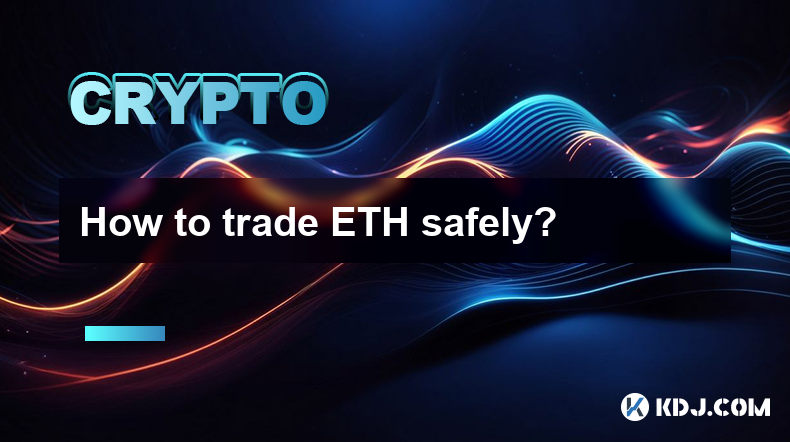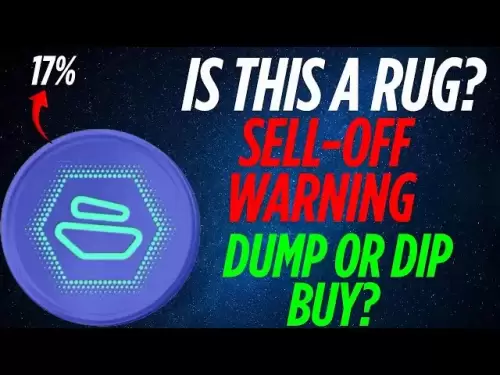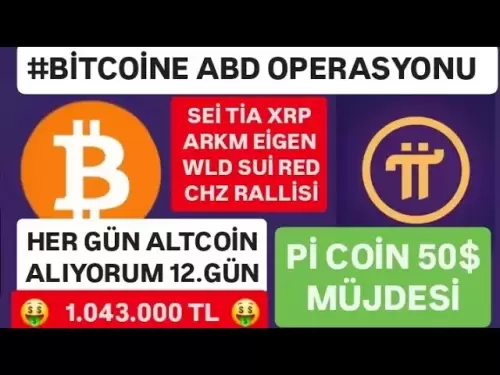-
 Bitcoin
Bitcoin $107,810.8710
-1.45% -
 Ethereum
Ethereum $2,531.4386
-1.75% -
 Tether USDt
Tether USDt $1.0000
-0.03% -
 XRP
XRP $2.2542
-0.99% -
 BNB
BNB $659.1350
-0.50% -
 Solana
Solana $148.5456
-2.40% -
 USDC
USDC $0.9999
-0.02% -
 TRON
TRON $0.2868
-0.44% -
 Dogecoin
Dogecoin $0.1666
-3.65% -
 Cardano
Cardano $0.5751
-2.36% -
 Hyperliquid
Hyperliquid $37.6845
-5.51% -
 Bitcoin Cash
Bitcoin Cash $494.9448
-0.65% -
 Sui
Sui $2.8396
-3.31% -
 Chainlink
Chainlink $13.2423
-2.59% -
 UNUS SED LEO
UNUS SED LEO $9.0482
0.02% -
 Stellar
Stellar $0.2467
-2.44% -
 Avalanche
Avalanche $17.8165
-3.63% -
 Shiba Inu
Shiba Inu $0.0...01158
-2.41% -
 Toncoin
Toncoin $2.7397
-3.42% -
 Hedera
Hedera $0.1560
-2.73% -
 Litecoin
Litecoin $85.8559
-2.34% -
 Monero
Monero $315.3710
-2.30% -
 Dai
Dai $1.0001
0.00% -
 Polkadot
Polkadot $3.3443
-2.03% -
 Ethena USDe
Ethena USDe $1.0001
0.01% -
 Bitget Token
Bitget Token $4.2888
-3.73% -
 Uniswap
Uniswap $7.3388
-1.57% -
 Aave
Aave $278.2986
-3.05% -
 Pepe
Pepe $0.0...09807
-3.67% -
 Pi
Pi $0.4563
-2.39%
How to trade ETH safely?
To trade ETH safely, choose a reputable exchange, secure your account with 2FA, manage funds wisely, understand market risks, and implement effective trading strategies.
Apr 17, 2025 at 02:49 pm

Trading Ethereum (ETH) can be a lucrative endeavor, but it also comes with risks. To ensure you trade ETH safely, it's crucial to follow a set of best practices and guidelines. This article will walk you through the essential steps and strategies to help you navigate the volatile world of cryptocurrency trading securely.
Choosing a Reputable Exchange
The first step in trading ETH safely is selecting a reputable exchange. Not all exchanges are created equal, and some may have poor security measures or be outright scams. Here's how you can choose a trustworthy platform:
Research the Exchange's Reputation: Look for user reviews and ratings on platforms like Trustpilot or forums dedicated to cryptocurrency. Pay attention to feedback regarding security, customer service, and transaction fees.
Check for Security Features: Ensure the exchange has robust security measures in place, such as two-factor authentication (2FA), cold storage for the majority of funds, and encryption for data protection.
Regulatory Compliance: Verify if the exchange is compliant with local and international regulations. Regulated exchanges are generally more reliable and offer better protection for users.
User Interface and Experience: A user-friendly interface can make a significant difference in your trading experience. Ensure the platform is easy to navigate and offers the features you need.
Securing Your Account
Once you've chosen an exchange, securing your account is paramount. Here are the steps to take to protect your ETH trading account:
Enable Two-Factor Authentication (2FA): This adds an extra layer of security by requiring a second form of verification, typically a code sent to your mobile device, in addition to your password.
Use Strong Passwords: Create a unique, complex password for your exchange account. Avoid using easily guessable information like birthdays or common words. Consider using a password manager to generate and store your passwords securely.
Beware of Phishing Attempts: Be cautious of emails or messages that ask for your login details or personal information. Always verify the sender's identity and never click on suspicious links.
Regularly Update Your Software: Keep your computer and mobile devices up to date with the latest security patches and software updates to protect against vulnerabilities.
Managing Your Funds
Proper fund management is crucial for trading ETH safely. Here's how you can manage your funds effectively:
Use a Hardware Wallet: For long-term storage, consider using a hardware wallet like Ledger or Trezor. These devices store your private keys offline, making them less vulnerable to hacking.
Keep Only Necessary Funds on the Exchange: Only keep the amount of ETH you plan to trade on the exchange. Transfer the rest to a secure wallet to minimize the risk of theft.
Diversify Your Investments: Don't put all your eggs in one basket. Diversify your cryptocurrency portfolio to spread the risk and protect against market volatility.
Monitor Your Transactions: Regularly review your transaction history and account activity to quickly identify and respond to any unauthorized or suspicious activity.
Understanding Market Risks
Trading ETH involves understanding and managing market risks. Here are some key points to keep in mind:
Volatility: The cryptocurrency market is highly volatile. Prices can fluctuate significantly in a short period. Be prepared for sudden changes and have a clear strategy for managing risk.
Liquidity: Ensure the exchange you use has sufficient liquidity to handle your trades. Low liquidity can result in slippage, where the executed price differs from the expected price.
Regulatory Changes: Stay informed about regulatory changes that could impact the cryptocurrency market. New regulations can affect the price and availability of ETH.
Market Sentiment: Pay attention to market sentiment and news that could influence ETH prices. Use tools like social media sentiment analysis and news aggregators to stay updated.
Implementing Trading Strategies
To trade ETH safely, you need to implement effective trading strategies. Here are some strategies to consider:
Dollar-Cost Averaging (DCA): This strategy involves investing a fixed amount of money at regular intervals, regardless of the market price. It helps reduce the impact of volatility and can lead to better long-term returns.
Stop-Loss Orders: Use stop-loss orders to limit potential losses. A stop-loss order automatically sells your ETH if the price falls to a certain level, helping you manage risk.
Technical Analysis: Use technical analysis to identify trends and make informed trading decisions. Tools like moving averages, RSI, and MACD can help you analyze market trends and price movements.
Fundamental Analysis: Stay informed about Ethereum's developments, such as network upgrades, partnerships, and adoption rates. Fundamental analysis can help you make long-term investment decisions based on the project's potential.
Avoiding Common Pitfalls
To trade ETH safely, it's important to avoid common pitfalls that can lead to losses. Here are some to watch out for:
FOMO (Fear of Missing Out): Avoid making impulsive decisions based on market hype. Stick to your trading strategy and don't let emotions drive your actions.
Overtrading: Trading too frequently can lead to high transaction fees and poor decision-making. Set a trading schedule and stick to it.
Ignoring Fees: Pay attention to the fees charged by the exchange. High fees can eat into your profits, so choose a platform with competitive rates.
Lack of Due Diligence: Always research before making a trade. Don't rely solely on tips from social media or forums without verifying the information yourself.
Frequently Asked Questions
Q: What should I do if I suspect my exchange account has been compromised?
A: If you suspect your account has been compromised, take immediate action. Change your password, enable 2FA if it's not already in place, and contact the exchange's customer support. Monitor your account closely for any unauthorized transactions and consider transferring your funds to a secure wallet.
Q: How can I protect my private keys?
A: To protect your private keys, use a hardware wallet for long-term storage. Never share your private keys with anyone, and avoid storing them on internet-connected devices. If you must store them digitally, use encrypted storage solutions.
Q: What are the signs of a potential scam in the cryptocurrency market?
A: Be wary of offers that promise guaranteed high returns, unsolicited investment advice, and platforms that lack transparency. Look out for poor grammar and spelling in communications, requests for personal information, and pressure to act quickly without time to verify the legitimacy of the offer.
Q: Can I trade ETH anonymously?
A: While some exchanges offer anonymous trading options, it's important to balance anonymity with security. Using a reputable exchange that requires identity verification can offer better protection and compliance with regulations. If anonymity is a priority, consider using a VPN and privacy-focused cryptocurrencies alongside your ETH trading.
Disclaimer:info@kdj.com
The information provided is not trading advice. kdj.com does not assume any responsibility for any investments made based on the information provided in this article. Cryptocurrencies are highly volatile and it is highly recommended that you invest with caution after thorough research!
If you believe that the content used on this website infringes your copyright, please contact us immediately (info@kdj.com) and we will delete it promptly.
- BlockDAG Leads the Web3 Race with Sports Partnerships and Strategic Pricing
- 2025-07-08 10:50:12
- Pepe, Dogecoin, Shiba Inu: Meme Coin Mania or Calculated Crypto?
- 2025-07-08 10:30:12
- Bitcoin, Ethereum, and Tariff Tussles: Decoding the Crypto Market's Latest Moves
- 2025-07-08 10:30:12
- PEPE, AVAX, Technical Analysis: Riding the Crypto Wave
- 2025-07-08 11:10:12
- BTC Whale's $8.6B Move: Hack, Transfer, or Just a FUD Panic?
- 2025-07-08 11:10:12
- Bitcoin, Treasuries, and the Surge: What's Driving the Market?
- 2025-07-08 11:15:11
Related knowledge

How to customize USDT TRC20 mining fees? Flexible adjustment tutorial
Jun 13,2025 at 01:42am
Understanding USDT TRC20 Mining FeesMining fees on the TRON (TRC20) network are essential for processing transactions. Unlike Bitcoin or Ethereum, where miners directly validate transactions, TRON uses a delegated proof-of-stake (DPoS) mechanism. However, users still need to pay bandwidth and energy fees, which are collectively referred to as 'mining fe...

USDT TRC20 transaction is stuck? Solution summary
Jun 14,2025 at 11:15pm
Understanding USDT TRC20 TransactionsWhen users mention that a USDT TRC20 transaction is stuck, they typically refer to a situation where the transfer of Tether (USDT) on the TRON blockchain has not been confirmed for an extended period. This issue may arise due to various reasons such as network congestion, insufficient transaction fees, or wallet-rela...

How to cancel USDT TRC20 unconfirmed transactions? Operation guide
Jun 13,2025 at 11:01pm
Understanding USDT TRC20 Unconfirmed TransactionsWhen dealing with USDT TRC20 transactions, it’s crucial to understand what an unconfirmed transaction means. An unconfirmed transaction is one that has been broadcasted to the blockchain network but hasn’t yet been included in a block. This typically occurs due to low transaction fees or network congestio...

How to check USDT TRC20 balance? Introduction to multiple query methods
Jun 21,2025 at 02:42am
Understanding USDT TRC20 and Its ImportanceUSDT (Tether) is one of the most widely used stablecoins in the cryptocurrency market. It exists on multiple blockchain networks, including TRC20, which operates on the Tron (TRX) network. Checking your USDT TRC20 balance accurately is crucial for users who hold or transact with this asset. Whether you're sendi...

What to do if USDT TRC20 transfers are congested? Speed up trading skills
Jun 13,2025 at 09:56am
Understanding USDT TRC20 Transfer CongestionWhen transferring USDT TRC20, users may occasionally experience delays or congestion. This typically occurs due to network overload on the TRON blockchain, which hosts the TRC20 version of Tether. Unlike the ERC20 variant (which runs on Ethereum), TRC20 transactions are generally faster and cheaper, but during...

The relationship between USDT TRC20 and TRON chain: technical background analysis
Jun 12,2025 at 01:28pm
What is USDT TRC20?USDT TRC20 refers to the Tether (USDT) token issued on the TRON blockchain using the TRC-20 standard. Unlike the more commonly known ERC-20 version of USDT (which runs on Ethereum), the TRC-20 variant leverages the TRON network's infrastructure for faster and cheaper transactions. The emergence of this version came as part of Tether’s...

How to customize USDT TRC20 mining fees? Flexible adjustment tutorial
Jun 13,2025 at 01:42am
Understanding USDT TRC20 Mining FeesMining fees on the TRON (TRC20) network are essential for processing transactions. Unlike Bitcoin or Ethereum, where miners directly validate transactions, TRON uses a delegated proof-of-stake (DPoS) mechanism. However, users still need to pay bandwidth and energy fees, which are collectively referred to as 'mining fe...

USDT TRC20 transaction is stuck? Solution summary
Jun 14,2025 at 11:15pm
Understanding USDT TRC20 TransactionsWhen users mention that a USDT TRC20 transaction is stuck, they typically refer to a situation where the transfer of Tether (USDT) on the TRON blockchain has not been confirmed for an extended period. This issue may arise due to various reasons such as network congestion, insufficient transaction fees, or wallet-rela...

How to cancel USDT TRC20 unconfirmed transactions? Operation guide
Jun 13,2025 at 11:01pm
Understanding USDT TRC20 Unconfirmed TransactionsWhen dealing with USDT TRC20 transactions, it’s crucial to understand what an unconfirmed transaction means. An unconfirmed transaction is one that has been broadcasted to the blockchain network but hasn’t yet been included in a block. This typically occurs due to low transaction fees or network congestio...

How to check USDT TRC20 balance? Introduction to multiple query methods
Jun 21,2025 at 02:42am
Understanding USDT TRC20 and Its ImportanceUSDT (Tether) is one of the most widely used stablecoins in the cryptocurrency market. It exists on multiple blockchain networks, including TRC20, which operates on the Tron (TRX) network. Checking your USDT TRC20 balance accurately is crucial for users who hold or transact with this asset. Whether you're sendi...

What to do if USDT TRC20 transfers are congested? Speed up trading skills
Jun 13,2025 at 09:56am
Understanding USDT TRC20 Transfer CongestionWhen transferring USDT TRC20, users may occasionally experience delays or congestion. This typically occurs due to network overload on the TRON blockchain, which hosts the TRC20 version of Tether. Unlike the ERC20 variant (which runs on Ethereum), TRC20 transactions are generally faster and cheaper, but during...

The relationship between USDT TRC20 and TRON chain: technical background analysis
Jun 12,2025 at 01:28pm
What is USDT TRC20?USDT TRC20 refers to the Tether (USDT) token issued on the TRON blockchain using the TRC-20 standard. Unlike the more commonly known ERC-20 version of USDT (which runs on Ethereum), the TRC-20 variant leverages the TRON network's infrastructure for faster and cheaper transactions. The emergence of this version came as part of Tether’s...
See all articles

























































































